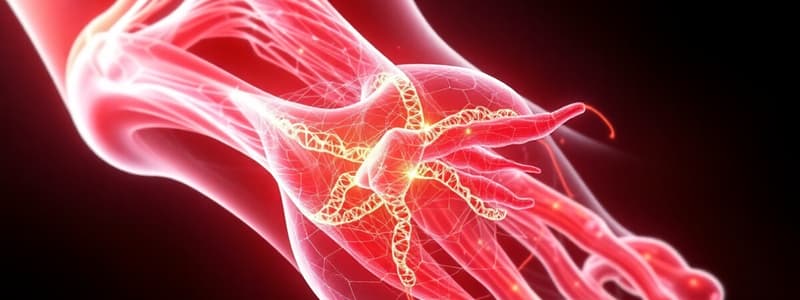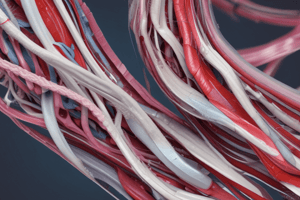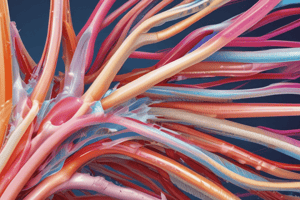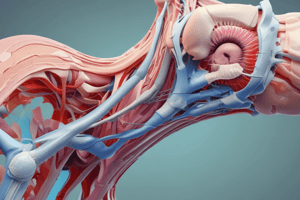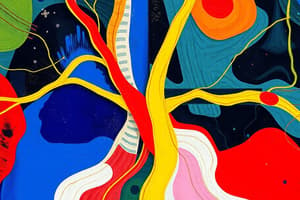Podcast
Questions and Answers
What happens during the 'toe' stage of stress and strain?
What happens during the 'toe' stage of stress and strain?
- The crimp inherent in the structure straightens. (correct)
- The tissue undergoes maximum load before failure.
- The tissue exhibits high stiffness.
- The tissue experiences irreversible deformation.
How do tendons behave at low strain rates?
How do tendons behave at low strain rates?
- They absorb more mechanical energy. (correct)
- They do not return to their original shape.
- They exhibit higher stiffness.
- They are more effective in carrying loads.
What is the primary cause of friction forces leading to tendon injuries?
What is the primary cause of friction forces leading to tendon injuries?
- Mechanical pinch of the tendon.
- Lack of flexibility. (correct)
- Irreversible deformation of the tendon.
- Anatomical abnormalities.
Which stage of stress and strain results in irreversible deformation of tissue?
Which stage of stress and strain results in irreversible deformation of tissue?
What primarily causes tensile forces that can lead to tendon injuries?
What primarily causes tensile forces that can lead to tendon injuries?
What is the primary function of tendons?
What is the primary function of tendons?
Which type of collagen predominantly composes tendons?
Which type of collagen predominantly composes tendons?
What role do tenocytes play in tendons?
What role do tenocytes play in tendons?
Which of the following layers is NOT part of tendon structure?
Which of the following layers is NOT part of tendon structure?
What type of mechanoreceptors are sensitive to transient mechanical displacements?
What type of mechanoreceptors are sensitive to transient mechanical displacements?
How do tenocytes respond to mechanical stimuli?
How do tenocytes respond to mechanical stimuli?
Which mechanoreceptor is primarily involved in sensing strain changes?
Which mechanoreceptor is primarily involved in sensing strain changes?
What is the purpose of the flanking layers around tendons, such as the epitenon and paratenon?
What is the purpose of the flanking layers around tendons, such as the epitenon and paratenon?
What is a common symptom of shoulder dislocation?
What is a common symptom of shoulder dislocation?
Which treatment method is recommended if a conservative approach fails for joint instability?
Which treatment method is recommended if a conservative approach fails for joint instability?
What is a critical step in the treatment of joint instability concerning exercise?
What is a critical step in the treatment of joint instability concerning exercise?
What should be evaluated before prescribing exercises for joint instability?
What should be evaluated before prescribing exercises for joint instability?
Which of the following is a risk associated with joint instability in the shoulder?
Which of the following is a risk associated with joint instability in the shoulder?
What is one of the primary functions of ligaments?
What is one of the primary functions of ligaments?
Which of the following is a characteristic of the composition of ligaments?
Which of the following is a characteristic of the composition of ligaments?
Which type of cells in ligaments is responsible for synthesizing procollagen?
Which type of cells in ligaments is responsible for synthesizing procollagen?
How do ligaments differ from tendons in terms of collagen organization?
How do ligaments differ from tendons in terms of collagen organization?
Which mechanoreceptor in ligaments is sensitive to joint position and range of movement?
Which mechanoreceptor in ligaments is sensitive to joint position and range of movement?
What is the primary component of the hierarchical structure of ligaments?
What is the primary component of the hierarchical structure of ligaments?
What percentage of the composition of ligaments is attributed to collagen?
What percentage of the composition of ligaments is attributed to collagen?
Which of the following contributes to the poor vascularization in ligaments?
Which of the following contributes to the poor vascularization in ligaments?
What characterizes reactive tendinopathy?
What characterizes reactive tendinopathy?
Which stage of treatment involves high-load strength training?
Which stage of treatment involves high-load strength training?
What is a common symptom of iliotibial band syndrome?
What is a common symptom of iliotibial band syndrome?
Which of the following is NOT a characteristic of degenerative tendinopathy?
Which of the following is NOT a characteristic of degenerative tendinopathy?
Which exercise type is emphasized in Stage 2 of the treatment protocol?
Which exercise type is emphasized in Stage 2 of the treatment protocol?
How long do the therapeutic exercise programs last according to the provided content?
How long do the therapeutic exercise programs last according to the provided content?
Which tendon injury is characterized by compression-entrapment in the subacromial space?
Which tendon injury is characterized by compression-entrapment in the subacromial space?
What is the primary purpose of Stage 1 in the treatment protocol?
What is the primary purpose of Stage 1 in the treatment protocol?
What is a recommended prevention strategy for athletes at risk of tendinopathies?
What is a recommended prevention strategy for athletes at risk of tendinopathies?
Which symptom is associated with a total tendon rupture?
Which symptom is associated with a total tendon rupture?
What is a common cause of tendon ruptures among weekend athletes?
What is a common cause of tendon ruptures among weekend athletes?
Which of the following is NOT a symptom of a partial tendon rupture?
Which of the following is NOT a symptom of a partial tendon rupture?
What is the focus of conservative treatment for tendon ruptures?
What is the focus of conservative treatment for tendon ruptures?
Which tendon rupture is characterized by an eccentric contraction of the quadriceps?
Which tendon rupture is characterized by an eccentric contraction of the quadriceps?
What type of training is critical after a tendon rupture for recovery?
What type of training is critical after a tendon rupture for recovery?
What anatomical feature does the Brunet-Guedj sign evaluate?
What anatomical feature does the Brunet-Guedj sign evaluate?
Which approach provides potentially better healing for tendon ruptures?
Which approach provides potentially better healing for tendon ruptures?
What should be considered before starting a rehabilitation program after tendon injury?
What should be considered before starting a rehabilitation program after tendon injury?
Flashcards
What is a tendon?
What is a tendon?
Tendon is a strong, fibrous tissue that connects muscles to bones, transmitting forces and providing joint position information.
What is the primary component of a tendon?
What is the primary component of a tendon?
Type I collagen fibers make up the majority of a tendon, forming strong bundles.
Which cells are most abundant in a tendon?
Which cells are most abundant in a tendon?
Tenocytes, the most abundant cells, maintain tendon health by producing extracellular matrix and responding to mechanical stress.
What is the role of the endotenon and epitenon in a tendon?
What is the role of the endotenon and epitenon in a tendon?
Signup and view all the flashcards
What are two types of mechanoreceptors found in tendons?
What are two types of mechanoreceptors found in tendons?
Signup and view all the flashcards
What is the role of Golgi tendon organs in tendons?
What is the role of Golgi tendon organs in tendons?
Signup and view all the flashcards
What is the role of neuromuscular spindles in tendons?
What is the role of neuromuscular spindles in tendons?
Signup and view all the flashcards
What are nociceptors in tendons?
What are nociceptors in tendons?
Signup and view all the flashcards
Stress (in biomechanics)
Stress (in biomechanics)
Signup and view all the flashcards
Strain (in biomechanics)
Strain (in biomechanics)
Signup and view all the flashcards
Toe Region of Stress-Strain Curve
Toe Region of Stress-Strain Curve
Signup and view all the flashcards
Linear Region of Stress-Strain Curve
Linear Region of Stress-Strain Curve
Signup and view all the flashcards
Yield Point of Stress-Strain Curve
Yield Point of Stress-Strain Curve
Signup and view all the flashcards
What is a ligament?
What is a ligament?
Signup and view all the flashcards
What are the main components of ligaments?
What are the main components of ligaments?
Signup and view all the flashcards
How do ligaments compare to other tissues in terms of vascularity and cells?
How do ligaments compare to other tissues in terms of vascularity and cells?
Signup and view all the flashcards
What role do fibroblasts play in ligament structure?
What role do fibroblasts play in ligament structure?
Signup and view all the flashcards
What is the structural organization of ligaments?
What is the structural organization of ligaments?
Signup and view all the flashcards
What are the main types of mechanoreceptors found in ligaments?
What are the main types of mechanoreceptors found in ligaments?
Signup and view all the flashcards
What is the role of nociceptors in ligaments?
What is the role of nociceptors in ligaments?
Signup and view all the flashcards
What is an epiligament and how does it differ in intra-articular ligaments?
What is an epiligament and how does it differ in intra-articular ligaments?
Signup and view all the flashcards
Reactive Tendinopathy
Reactive Tendinopathy
Signup and view all the flashcards
Tendon Dysrepair
Tendon Dysrepair
Signup and view all the flashcards
Degenerative Tendinopathy
Degenerative Tendinopathy
Signup and view all the flashcards
Subacromial Impingement
Subacromial Impingement
Signup and view all the flashcards
Iliotibial Band Syndrome
Iliotibial Band Syndrome
Signup and view all the flashcards
Epicondylitis
Epicondylitis
Signup and view all the flashcards
Patellar Tendinopathy
Patellar Tendinopathy
Signup and view all the flashcards
Therapeutic Exercise Programme
Therapeutic Exercise Programme
Signup and view all the flashcards
Joint Dislocation
Joint Dislocation
Signup and view all the flashcards
Joint Instability
Joint Instability
Signup and view all the flashcards
Rehabilitation for Joint Instability
Rehabilitation for Joint Instability
Signup and view all the flashcards
Labral-Anchored Capsulorrhaphy or Ligamentoplasty
Labral-Anchored Capsulorrhaphy or Ligamentoplasty
Signup and view all the flashcards
Exercises for Joint Instability
Exercises for Joint Instability
Signup and view all the flashcards
Progressive Resistance Training
Progressive Resistance Training
Signup and view all the flashcards
Explosive Gestures
Explosive Gestures
Signup and view all the flashcards
Eccentric Training
Eccentric Training
Signup and view all the flashcards
Balance Training
Balance Training
Signup and view all the flashcards
Tendinopathy
Tendinopathy
Signup and view all the flashcards
Tendon Rupture (Complete)
Tendon Rupture (Complete)
Signup and view all the flashcards
Tendon Rupture (Partial)
Tendon Rupture (Partial)
Signup and view all the flashcards
Biomechanical Alteration
Biomechanical Alteration
Signup and view all the flashcards
Achilles Tendon
Achilles Tendon
Signup and view all the flashcards
Patellar Tendon Rupture
Patellar Tendon Rupture
Signup and view all the flashcards
Study Notes
Tendon Composition and Structure
- Tendons connect muscles to bones, withstanding high tensile forces.
- Tendons are composed of regular, densely packed, parallel bundles of connective tissue.
- They transmit forces from muscle to bone, providing feedback to the brain about joint position.
- Tendons facilitate joint movement via muscle contractions.
- Primary components are thick bundles of Type I collagen fibers.
- Ground substance is limited.
- Primarily contain fibroblasts/tenocytes (cells that synthesize and maintain extracellular matrix).
- Tenocytes are the most common cell type.
- Tenocytes synthesize the extracellular matrix and maintain homeostasis.
- Tendons are sensitive to mechanical stimuli, adapting to loads through anabolic or catabolic changes.
- Tendon structure has hierarchical layers (fibrils, fibers, fascicles).
- Endotenon surrounds fascicles.
- Epitenon covers the tendon.
- Paratenon covers the epitenon.
- Proteoglycans and glycoproteins align the tendon.
Ligament Composition and Structure
- Ligaments connect bones, withstanding substantial tensile forces, but less than tendons.
- They are made of regular bundles of dense connective tissue arranged in parallel bundles.
- Ligaments reinforce joints, guide movements, and provide proprioceptive feedback to the central nervous system.
- Primarily composed of collagen and elastic fibers.
- Ligament fibers are less organized compared to tendon fibers.
- Ground substance and fibroblasts are present.
- Some ligaments have more elastic fibers than collagen fibers.
Tendon and Ligament Cells
- Tendons contain tenocytes, which are responsible for extracellular matrix synthesis and repair.
- Ligaments contain fibroblasts, which also contribute to matrix synthesis and repair.
Tendon and Ligament Biomechanics
- Tendons & ligaments are viscoelastic, possessing both elastic and viscous properties due to the molecular composition & arrangement
- In tendons, stress-strain curves show a toe region (minor load), linear region (stable load), yielded region (irreversible deformation), and failure region (peak load).
- Ligament also has distinct stress-strain behavior.
- At low strain rates Tendons absorb energy and are less effective for higher loads.
- At high strain rates Tendons are highly stiff and efficient in transmitting muscle forces to bone.
- Both tendons and ligaments respond to mechanical stimuli, adapting their structure and function to maintain appropriate levels of strength, stability, and elasticity.
Tendon and Ligament Injuries
- Tendon and ligament injuries can arise from overuse, trauma, or a combination of factors.
- Common diagnoses include tendinopathies and tendinopathy.
- Both injuries can stem from acute or chronic events/conditions.
Tendon and Ligament Treatment/Prevention
- Treatment strategies for tendon and ligament injuries include rest, ice, compression (braces), elevation (RICE), physiotherapy, and strengthening exercises.
- Prevention strategies include gradual progression of activity, appropriate warm-up routines, maintaining proper posture, and using proper technique when lifting weights.
- Injuries vary significantly based on the specific location of damage within the tendon or ligament, and this must be carefully analyzed.
Studying That Suits You
Use AI to generate personalized quizzes and flashcards to suit your learning preferences.
